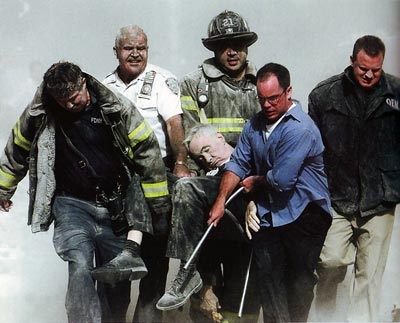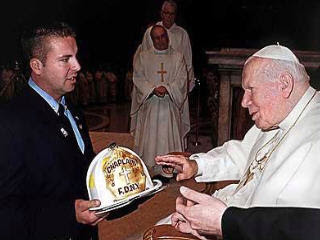I concur with your premise but I'd add that natural law doesn't come with an expiration date. Most religions and societies throughout time have had laws against murder, stealing and lying.
Indeed they do. But they also have evidence to back up WHY they have laws against such things. Murder, stealing, and lying can all bring some sort of actual harm to humanity as a whole. That is a logical reason for outlawing such activities.
Though, I would also argue that even with those, there are still some "gray" areas. Murdering someone in self-defense is okay. The death penalty is okay with some people. Some have no problem with "justifiable war". You're killing someone in all of those instances, but society can sometimes "look the other way" and not be as rigidly against murder.
Stealing, too. Stealing food to feed your family, for instance. Some could argue that's an exception. Stealing from people who have taken from others (Robin Hood). Some are fine with that. And lying can have its leeways, too-lying to protect someone from pain. No matter the situation, we can always find a moment where someone will say, "Well, yeah, it's wrong, but in
this case, I guess I can understand...".
They all address marriage in some way too. Societies and laws evolve with time and that includes marriage. So I don't see defense of traditional marriage as clinging to 2,000 year-old dogma but rather recognizing what has served Western civilization well for 2,000 years and hesitating to redefine it without considering the ramifications.
And yet we're not following the truly "traditional" definition of marriage today, you realize? At one time "traditional marriage" meant that a woman was a man's property, to essentially be brought and sold at his whim. At one time a "traditional" marriage was one that was arranged by the families, without any sort of consent from the bride and groom-to-be themselves.
But we were willing to move away from THOSE definitions eventually, because we didn't agree with them, because they were proven to be crap ways to get married, because they treated all involved as less than human, etc., etc. So why was that change in definition okay, but expanding the definition of "traditional" marriage to include gay couples isn't?
The concepts of human rights and individual autonomy have evolved as well. I cherish that I live in a country that is always balancing the scales between the individual right to "Life, Liberty and the pursuit of Happiness," and the need for social cohesion and the right to self-determination.
I do, too. But how can you not see the contradiction in us having that motto of "life, liberty, and the pursuit of happiness" all the while denying a certain portion of the country the same rights and privileges everyone else gets to enjoy?
And the right to self-determination is a great right to have. So why shouldn't gay people be able to determine their own lives as they see fit? Why would it be wrong for them to be able to decide who they want to marry, to be allowed to get married if they so choose?
It never fails to amuse me how conservative thought values the concept of personal freedom, then turns around and tells a certain portion of the population they can't do this or that because the Bible says they shouldn't. The government telling us what to do=wrong. The Bible telling us what to do=a-ok. The entity giving orders may be different, but you're still being controlled by someone, aren't you?
So, what do I mean by ramifications. Let's fast forward out of the Old Testament, past chastity belts, the Victorian era and getting to 2nd base with Mary Lou at the drive-in in your dad's 1957 Thunderbird. To heck with Disney flicks let's sneak into our first R rated movie, "The Sexual Revolution of the Sixties."
It certainly wasn't our first flirtation with loosening our sexual mores and books have been written on the subject--and I'm glad my puberty occurred post-revolution -- but isn't it fair to point out that society, in may ways, is worse off for it? That perhaps we threw out the baby with the bath-water (literally in the case of 54 million abortions since 1973). That many of our current problems stem in no small way from the liberation of society from the "hang-ups" of previous generations about sex. That we have guardrails and social stigmas on human behavior for good reason in many cases. That because, in hindsight, we moved too fast we all now pay a cost for the sharp increases in teen pregnancy, STD's, pornography addiction and out-of-wedlock births? That marriage behavior was also changed as people married later and divorce became easier.
No, it's not fair to say that, because that's a matter of opinion. Yes, some bad things have come from "sexual liberation". Certainly abortion is a tragic situation, no matter which side of that debate you're on.
However, women were having abortions when they were illegal, too. And we don't know what the exact number is during its illegal days versus its legal days, because in its illegal days, women had to hide the fact that they did it, lest they be punished for doing so. So who knows if it's gotten "worse" or "better" since becoming legal. Besides that, many women see the idea of being able to have control over their bodies to be a good result.
If a young girl found herself "in trouble" she was essentially forced into a shotgun marriage. Certainly I agree that if a man gets a woman pregnant, he should do the honorable thing and stick around (if we have a problem with the woman backing out of being a mother, we need to have as equal a problem with the man backing out of being a father). Yet forcing people into marriages as a means to solve this problem doesn't exactly strike me as the most rational thing to do. It often seems to create
more issues, not less. Out of wedlock births can't lead to any worse of problems than those faced by kids who were born within wedlock. Just because your parents are married when they have you doesn't mean you're going to have a happier, less complicated life as a result.
(I'd also note that it's REALLY funny to hear religious people get up in arms about out of wedlock births...Jesus, anyone? Not Joseph's son, if I recall rightly.)
I'm not a fan of the idea of divorce, or teen pregnancy, either. But while I agree that some people get divorced over the dumbest things and should learn to work out their issues instead of throw in the towel the moment things get the slightest bit hard, I also know people get divorced for very logical reasons. If two people don't love each other anymore, I don't see how forcing them to stay together benefits them or anyone else. The problem, to me, often seems to lie in how the couple DEALS with divorce more than anything else.
Teen pregnancy can be slowed, if not stopped, by properly educating kids on the good, the bad, and the ugly of sex (at age appropriate levels). By teaching girls self-worth from an early age, and teaching men how to be gentlemen. You can tell a kid "Just don't do it" all you want, but if you don't give them a strong, logical reason as to
why, that lesson will go in one ear and out the other. If I ever have kids, I will certainly make it clear that I want them to wait until they're adults to have sex. But I'm not going to shy away from discussing the subject and answering any questions they have about it, either. And if they don't wait, as sad as that will make me, and as much as I'd try to convince them to stop, at the same time, I will also hope I've educated them enough to know that they will be responsible and safe, and that if something does happen, they can come to me and we'll handle it as best we can.
Pornography addiction? Who determines when you are "addicted", anyway? Certainly all day, every day, to the point of not bothering with anything else, would count as a problem, but a teenager sneaking a peek at a magazine? A person hopping online and looking up an occasional porno? Catching a dirty flick on late night TV once? Not really something to wring our hands over. People are curious. They're going to look at such things. And again, don't make it so forbidden and shameful and it probably wouldn't be as big a deal. Oh, people would still look, but there's a sneaky thrill to it now that would be gone if we didn't treat it as an OMG IT'S SO HORRIBLE! sort of thing.
All of these things happened well before the sexual revolution of the '60s. They just weren't talked about. And when they were, they weren't dealt with properly. Homosexuality was classified as a freaking
mental illness up into the
1970s. There are indeed some problems related to sexuality-abortion, divorce, STDs, teen pregnancy-that can be dealt with, should be dealt with, no question. But the key to fixing those things lies in education, understanding, honest talk about such matters. Not in trying to pass constitutional amendments or abstinence only programs or shunning people who find themselves in such situations or whatever.
And as others have stated, none of the things mentioned in your post there explain the current attitude among some against letting gay people get married. Why should gay people not get married, in your eyes? What is their role in the whole "societal downfall" scenario you laid out?
Now we all could name the pill, women entering the workforce in large numbers, removal of censorship laws, inter-racial marriage and other changes as good things. And a lot was going on in the 60's & 70's, I don't mean to simplify this but, as I say, books have been written. My points:
1) Often there is wisdom in tradition.
2) Change should be informed by experience, have a purpose and be able to withstand deliberation.
3) A reasonless defense of the status quo is no defense but neither is advocating change that fails to preserve and improve society.
1. There is wisdom in tradition, yes. Sometimes. Other times, tradition is simply a nostalgic thing that holds no relevance to and negatively affects the society. Just because it's tradition doesn't mean it's right, or we should honor it. There has to be a reason behind doing so.
2. Agreed on this.
3. Agreed on this as well. In the case of legalizing gay marriage, I'd say there's quite a list of reasons as to why making it legal would preserve and improve society as a whole.
What does it have to do with gay people? If you want to make religious teachings or insulting speech against homosexuals a "hate crime" I think I get to say, "Hey wait a minute."
What about that would make you say "Hey, wait a minute"? If you are insulting homosexuals, that IS hate speech. You hate them and have no problem saying so. We're simply calling it what it is.
I do think people should be allowed to say what they want, regardless of how nasty it is. But if someone says something that is anti-gay in nature, the other side gets to have its own "Hey, wait a minute" reaction.
And I think I can recognize your individual rights and Equal Protection rights though civil unions while preserving the uniqueness of marriage as between a man and a woman.
See, I don't get this. Gay couples are doing the
exact same thing straight couples are doing. They're having a ceremony. They're pledging their love to each other. They're planning to spend their lives together. They're celebrating with family and friends. The ONLY thing that is different is the gender of the people involved.
So either gay AND straight couples have "civil unions" and "marriage" is left to the church, or if straight people get to call it a marriage no matter what, so do gay people. This whole thing of, "Well, we'll let you do the same thing we're doing, but you have to call it something different" smacks me as extremely childish. We straight people do NOT "own" the word "marriage".

 The people I know that made the "worst" sexual mistakes were the people who were ultra sheltered as children and taught abstinence only sex education by parents that did not want to have the talk. If you don't understand sex and all the good and bad that comes with it, you won't be able to see the red flags when you're in the real world.
The people I know that made the "worst" sexual mistakes were the people who were ultra sheltered as children and taught abstinence only sex education by parents that did not want to have the talk. If you don't understand sex and all the good and bad that comes with it, you won't be able to see the red flags when you're in the real world. 
 . I also liked the line immediately following that one:
. I also liked the line immediately following that one:



